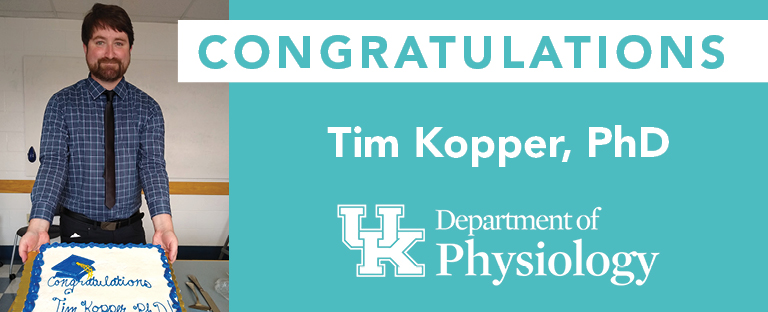Congratulations Timothy Joseph Kopper, PhD!
On Tuesday, July 27, 2021 Timothy Joseph Kopper successfully defended his dissertation and earned his doctoral degree. Congratulations, Dr. Kopper!
MYELIN, CPLA2, AND AZITHROMYCIN: MODULATION OF MACROPHAGE ACTIVATION IN SPINAL CORD INJURY INFLAMMATION
Doctoral Committee Members
Dr. John Gensel, Department of Physiology, Mentor
Dr. Donna Wilcock, Department of Physiology
Dr. David Feola, Department of Pharmacy Practice and Science
Dr. Edward Hall, Department of Neuroscience
Dr. Mariana Nikolova-Karakashian Department of Physiology
Dr. Ann Stowe, Department of Neurology, Outside Examiner
Abstract of Dissertation
Spinal cord injury (SCI) produces a chronic inflammatory state primarily mediated by macrophages consisting of resident microglia and infiltrating monocytes. These chronically activated SCI macrophages adopt a pro-inflammatory, pathological state that continues to cause additional damage after the initial injury and inhibits recovery. While the roles of macrophages in SCI pathophysiology are well documented, the factors contributing to this maladaptive response are poorly understood. Here, we identify the detrimental effects of myelin debris on macrophage physiology and demonstrate a novel, activation state-dependent role for cytosolic phospholipase-A2 (cPLA2) in myelinmediated potentiation of pro-inflammatory macrophage activation. Macrophagemediated inflammatory responses are promising therapeutic targets; however, there are very few therapeutic options to treat SCI and none that target macrophages. Here, we provide evidence that treatment with the immunomodulatory antibiotic azithromycin (AZM), initiated after SCI, improves recovery by targeting macrophage activation. There is an urgent need for the development of new therapies for the treatment of SCI. Macrophage-targeted therapies hold great promise; however, these treatment candidates require additional development before they can advance towards clinical use. Here we discuss the continued development of cPLA2 as a therapeutic target, the steps necessary to advance AZM towards clinical use, and lastly, we review additional macrophage-targeted therapies currently in development. Collectively this body of work identifies key mechanisms driving macrophage pathophysiology after SCI and identifies macrophage-targeted therapies that reduce this neuroinflammation to improve recovery after SCI.
Acknowledgements
I am very fortunate to have performed my graduate work in the University of Kentucky College of Medicine, where I have been able to work with many people over the years. In particular, I am grateful for all the wonderful colleagues I have in the Department of Physiology and the Spinal Cord and Brain Injury Research Center (SCoBIRC). I would first like to thank my advisor, Dr. John Gensel, for all his support throughout my graduate work. He conveys constant positivity and enthusiasm to the lab, which has helped nurture a constructive and welcoming environment. Through his guidance, I have progressed greatly scientifically while still maintaining a positive graduate school experience. Next, I would like to thank Bei Zhang, a former post-doc in our lab. When I first joined the lab, Bei spent countless days and late nights training me in numerous scientific techniques for my experiments. At the time I was appreciative, but I thought that was just how labs were run. It wasn’t until later I realized just how above and beyond she went to selflessly lend me her technical expertise. I would also like to thank William Bailey in our lab for all of his assistance in my animal studies over the years; I surely could not have performed them without him. Generally, I would also like to thank all the past and present members of the Gensel laboratory for all the help over the years and for keeping the lab a fun and pleasant place to work. I would like to thank Zel Madison, our primary administrator in SCoBIRC. She has been amazing to work with over the years, kindly helping me out with countless issues. Similarly, Andrew Hernandez in Physiology has also been very helpful since he joined the department. I would also like to thank my committee members Drs. John Gensel, Donna Wilcock, Mariana Nikolova-Karakashian, Dave Feola, and Ed Hall for all their advice and guidance. They were instrumental in formulating my projects, allowing for successful grant applications and manuscript publications essential for the progression of my career. I quickly came to learn that committee meetings were not something to be feared, rather look forward to, as they clearly had my best interests in mind. I have worked with many people over the years, too many to thank; however, collectively, all of these interactions have contributed to the progression of my graduate work and my overall great experiences during my time at the University of Kentucky.
